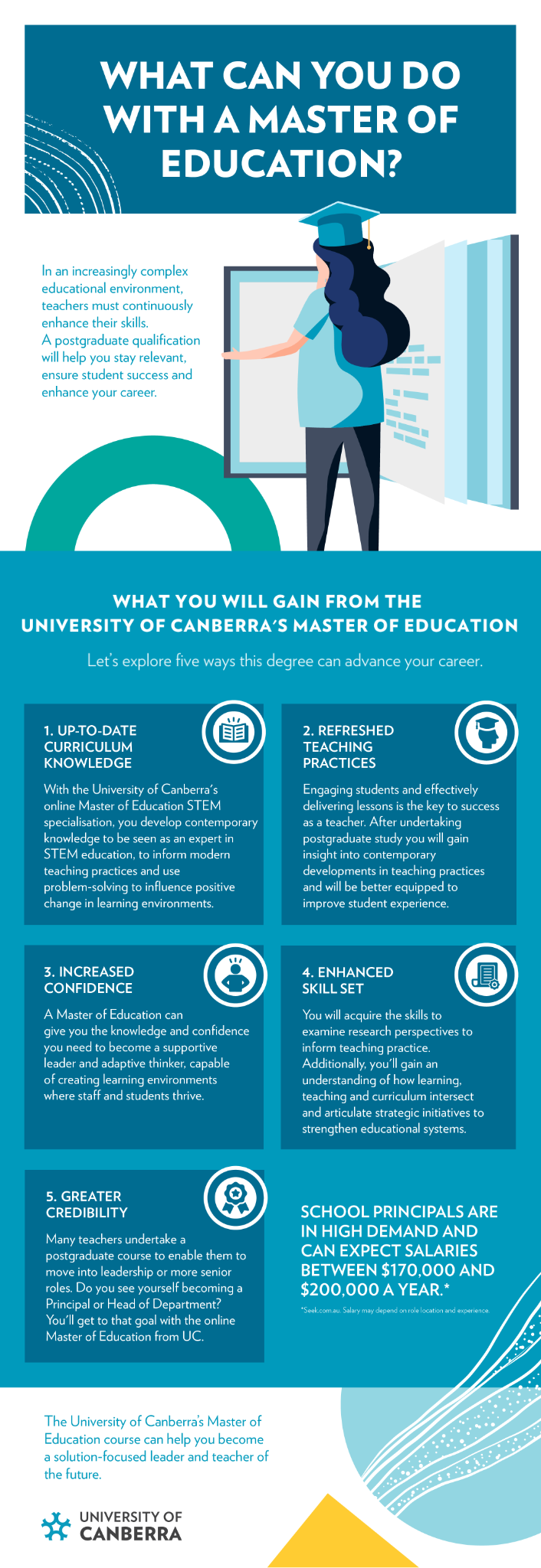What can you do with a Master of Education?

As a teacher working in an increasingly complex educational environment, it’s crucial for you to continually improve your skills.
A master’s degree, such as the online Master of Education from the University of Canberra, can provide you with the opportunity to gain specialised knowledge in Educational Leadership and STEM Education develop new teaching strategies and learn how to implement evidence-based practices to promote student success. So, where can a Master of Education take you? Let’s find out.
What will you gain from your master’s qualification?
You already have an undergraduate degree or postgraduate diploma that has provided you with many essential skills. So, what can you do with a Master of Education?
This advanced program is designed to deepen your knowledge and improve your teaching and leadership practice. Additionally, you’ll develop research and analytical skills that are essential for today’s education leaders, giving you the confidence to innovatively tackle issues in education practice and policy. Even if you hold a leadership role, a Master of Education can strengthen the quality of your current role by deepening your breadth of knowledge and enhancing your skill set. A Master of Education can also help prepare you for the next step in your career.
Matthew Brown is the Master of Education Program Director and Associate Professor at the University of Canberra. “In undertaking postgraduate study, our students have demonstrated their commitment to their profession, their school and their students,” he says. “Completing a master’s degree demonstrates a candidate’s academic achievements as well as their capacity to prioritise work expectations and to manage time. A teacher’s postgraduate qualifications highlight a commitment to lifelong learning.”
Let’s explore five ways the Master of Education from UC can advance your career.
Up-to-date curriculum knowledge
While you might be considering a Master of Education to enhance your chances of moving into a leadership role, the skills you learn will also help you in your educational career.
By undertaking critical analysis of education theory, graduates of the University of Canberra’s online Master of Education course gain a deepened understanding of contemporary practices to ensure they are at the forefront of the educational sector. They will develop specialised knowledge to be seen as an expert in education, identify how research can inform modern teaching practice and use creative problem-solving to influence positive change in learning environments.
“Students will learn how best to engage with and apply research-informed strategies, integrated with their practical educational experience, to shape informed educational responses and solutions to meet the professional challenges of their role and for future leadership positions,” says Brown.
Refreshed teaching practices
Engaging students and effectively delivering lessons is the key to success as a teacher. Professionals who undertake postgraduate study will gain insight into contemporary developments in teaching practice and are better equipped to improve student experience and cultivate positive and inclusive learning environments.
A master’s degree can help hone your communication skills, allowing you to model and support your colleagues to enhance a student’s learning and participation in the classroom. You’ll gain a deep awareness of your ethical responsibility as a teaching professional. As part of your course, you’ll also learn to gather, analyse and evaluate information more creatively and apply your new problem-solving skills to devise solutions to novel situations.
Increased confidence, particularly in challenging classrooms
“School and system leaders need to recognise that education for students and staff is a journey,” says Brown. “This journey requires leadership. Today, teachers need to guide and care for the needs of those travelling on this journey with them; students and staff.”
When challenges arise, a teacher must be able to confidently lead their students. While needing to work collaboratively with students and other professionals, teachers also need leadership and management skills to navigate and respond to changes in the educational landscape.
A Master of Education can give you the confidence to become a more supportive leader and adaptive thinker, capable of creating learning environments where staff and students thrive.
Enhanced skill set
In the past decade or so the teaching profession has changed profoundly, and there is more change to come. “If you work in education, you are in the business of change,” says Brown. “Knowing how to evaluate and assess the impact of a program is an essential skill, which every educator and school leader will need to become more expert. This is the wave of change that is already crashing down on the educational landscape. Educators will need to become increasingly skilled and knowledgeable about how to ride those waves.”
Managing change can be challenging, and it’s the desire to become more agile in the face of change that has many teachers turning to postgraduate study.
As part of a master’s degree, you’ll learn those skills essential for teaching and leading into the future. Throughout your studies, you will learn to evaluate and assess professional knowledge critically. Additionally, you’ll gain an understanding of how globalisation has affected education, and you’ll acquire the skills to examine research perspectives and methodologies.
Greater credibility beyond the classroom
Of course, many teachers undertake a postgraduate course to enable them to move into leadership roles. “Addressing and effectively responding to student wellbeing is increasingly important,” says Brown.
“As much as it is incumbent on education systems to care for student wellbeing, as well as engage and challenge students, retaining teaching staff requires them also to be engaged, challenged and feel respected and cared for.
“In accepting that these are some of the challenges being met by schools and education systems, the University of Canberra’s Master of Education directly addresses these needs by developing adaptive learners, teachers and leaders. We build the professional capacity of school leaders and teachers to create positive, structured and researched solutions to respond to complex educational challenges in a range of contexts.”
Where are the jobs for Master of Education graduates?
So what are the Master of Education job opportunities? Let’s explore three Master of Education degree jobs you can pursue:
- Principal
- Curriculum expert
- Head of faculty or department
Principal
Do you see yourself becoming a school principal? You’ll get closer to that goal with a master’s degree. In the role of a principal, you will be responsible for recruiting teachers, managing your school’s finances, setting policy, communicating with the school community, monitoring student performance, enforcing disciplinary codes and ensuring the curriculum is delivered to appropriate standards. Principals can also make a positive impact on their students and community through engaging and challenging their teaching teams to foster a culture of improving student learning and wellbeing.
School principals are in demand around the nation, with about 850 jobs advertised on Seek in April 2023.
The salary you earn as a principal can vary depending on the location of the role and state in which you find work, but generally principals can generally expect to earn between $170,000 and $200,000 a year.
Curriculum expert
Curriculum developers, education advisers and reviewers are vital to the education system. While not all roles require a postgraduate qualification, a Master of Education can help you successfully move into this area.
Curriculum developers are experts who create learning resources and develop courses and specialist units of work for teachers. They analyse data and carry out research, review educational materials, conduct teacher professional learning and keep up to date with new technologies and teaching techniques. Studying a Master of Education with a leadership specialisation in in-demand areas such as STEM, can build upon your existing strengths as a teacher, allowing you to pursue a specialist role as a curriculum expert.
As schools and government education departments focus on improving the effectiveness of education for students, curriculum developers and education will have a vital role to play.
The salary you earn as a curriculum exert can vary depending on the location of the role and the state in which you find work. Generally, a curriculum expert can expect to earn between $131,000 and $134,000 a year in this role.
Head of faculty or department
Heads of schools, faculties or departments (also known as an assistant principal or head of primary in lower grades), are responsible for overseeing the educational and administrative features of their school departments. They evaluate and assess educational and administrative policies, communicate with parents and the school community, and offer guidance to teachers and students. They monitor new developments in education and assist teachers to implement new programs.
Demand for these roles depends on the job’s location, plus your skills and qualifications.
Expect to earn a base salary of around $130,000 a year in this role.
Your future in education starts today
What does your future look like after completing a master’s degree in education? Job opportunities, career promotion and more await.
Are you ready? University of Canberra’s online Master of Education offers specialisations in leadership and STEM and can help you become a solution-focused leader and teacher of the future that you want to be.
Learn more or enquire on our website today.




